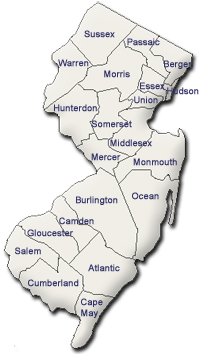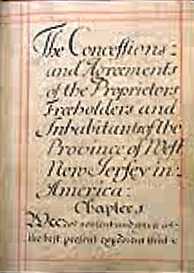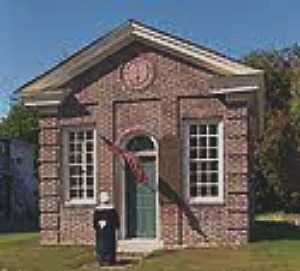Related Topics
Delaware (State of)
 Originally the "lower counties" of Pennsylvania, and thus one of three Quaker colonies founded by William Penn, Delaware has developed its own set of traditions and history.
Originally the "lower counties" of Pennsylvania, and thus one of three Quaker colonies founded by William Penn, Delaware has developed its own set of traditions and history.
...Ratification, Bill of Rights and Other Amendments
The 1787 Constitution lacked a Bill of Rights. Few except Madison himself were opposed to adding one, but many other delegates would have failed election without promising it. Negotiations at the Convention had proved so excitingly innovative that time ran out before the Convention had to adjourn with only a promise of a Bill of Rights, first thing.
Philadelphia Legal Scene
The American legal profession grew up in this town, creating institutions and traditions that set the style for everyone else. Boston, New York and Washington have lots of influential lawyers, but Philadelphia shapes the legal profession.
Quakers: The Society of Friends
According to an old Quaker joke, the Holy Trinity consists of the fatherhood of God, the brotherhood of man, and the neighborhood of Philadelphia.
Quakers: William Penn
Although Ben Franklin gets more ink lately, William Penn deserves at least equal rank among the most remarkable men who ever lived.
..The Constitution
Our Constitution was not a proclamation written by a convention. It was a negotiated contract for uniting thirteen sovereign independent states. Nothing like that had ever been done voluntarily, and few nations have matched it in two hundred years, even with the use of force.
New Jersey (State of)
 The Garden State really has two different states of mind. The motto is Liberty and Prosperity.
The Garden State really has two different states of mind. The motto is Liberty and Prosperity.
Government Organization
Government Organization
Shaping the Constitution in Philadelphia
After Independence, the weakness of the Federal government dismayed a band of ardent patriots, so under Washington's leadership a stronger Constitution was written. Almost immediately, comrades discovered they had wanted the same thing for different reasons, so during the formative period they struggled to reshape future directions . Moving the Capitol from Philadelphia to the Potomac proved curiously central to all this.
Concessions and Agreements

|
| Concessions and Agreements |
The United States Constitution is a unique achievement, but it had significant precursors, many of which James Madison had studied at Princeton. In the days of difficult ocean travel, almost all colonies were bound by an agreement to maintain loyalty to their European owners in spite of receiving latitude to govern themselves. Charters and documents defining these roles were generally written by the owners, and the colonists could pretty much take them or leave them. In the case of New Jersey in 1664, however, a very formidable lawyer and friend of the King named William Penn was drawing up agreements to his own conditions of sale, taking care that the grant of governing authority he received was favorable. Penn's relationship to the King was unusually good, to say the least. He had more reason to be wary of nit-pickers in the King's administration, trying to anticipate every conceivable disappointment for some successor King.
For his part, Penn wanted to make colonial land attractive to re-sell to religious groups who had experienced harsh government oppression; he wanted no obstacles to his announcing there would be no religious oppression in New Jersey. He was offered the role of sub-king although he hastily rejected any such title, and needed to repeat the formalities of the Charter to define his role and reassure his settlers about that matter. Furthermore, he was dealing with the heirs of Carteret and Berkeley, active participants in North and South Carolina. So Penn's method of achieving basic rights was influenced by prior thinking in the Carolinas, as the thinking of John Locke secondarily influenced matters in Delaware and Pennsylvania. These ideas were incorporated in a New Jersey document called "Concessions and Agreements." The concepts were not wholly the ideas of William Penn, but he did write it, and it does contain many ideas that were uniquely his. Understandings about limits were set down, argued about, and agreed to. The owner risked money, the colonist risked his life. Neither would agree unless a reasonable bargain was struck in advance of any dispute. Furthermore, the main value of a colony was beginning to shift from trading rights to real estate rights. Carteret and Berkeley had not only been principals in both the Carolinas and the Jerseys but had been involved in a number of such investments in Africa and the West Indies; New Jersey was just another business deal. It was conventional for documents of this type to define the method of selection of a governor, the establishment of an assembly of colonists, and some sort of council to attend to day to day affairs. In that era, few colonists would cross the ocean without a guarantee of religious freedom, at least for their own brand of religion. Standard clauses which may sound strange in today's real estate world, were then necessary because it was a transfer of not merely land, but also the terms of government. In the case of the Quaker colonies, many of these stipulations were included in the earlier charter from the King. It seems very likely that Penn hovered around and negotiated these points which he wished to have the King agree to; and then once the land was safely his, Penn repeated and expanded these stipulations with the colonists in his Concessions and Agreements . It wasn't exactly a Constitution, but it reads a lot like the one America adopted a century later.

|
| Proprietors House |
Quakers had suffered persecution and imprisonment, and knew exactly what they feared; on the other side, it seems likely Carteret and Berkeley were less interested. So this real estate transfer document conceded almost anything the colonists wanted and the King would stand for, couched in conciliatory phrases. For example, no settler was to be molested for his conscience, and liberty was to be for all time, and for all men and Christians. Elections, by the way, must be annual, and by secret ballot. While law and order must prevail, nevertheless no man is to be imprisoned or molested except by the agreement of twelve men of the neighborhood. On the matter of slavery, no man was to be brought to the colony in bondage, save by his own consent (that is, indentured servants were to be permitted). And in what proved to be a final irony for William Penn, there was to be no imprisonment for debt. Almost all of these innovative ideas survived into the U.S. Constitution a century later, but the most innovative idea of all was to set them all down in a freely-made agreement in writing. This was not merely how a government was organized, it defined the set of conditions under which both sides agreed it would operate.
It was, of course, more than that. It was a set of reassurances to settlers who had been in New Jersey before the English arrived that they, also, would be treated as equals. It was a real estate advertisement to the fearful religious dissenters back in England that it was safe to live here. And it was a reminder to future Kings and Parliaments that this is what they had promised.
The pity and a warning, is that the larger vision of a whole continent governed fairly by common consent may have been too grandiose for a little band of New Jersey Quakers, surrounded as they were by an uncomprehending world. All utopias are helpless when stronger neighbors reject the basic premise. However, it was the expansion of the pacifist concept to the much larger neighboring territory of Pennsylvania that proved to be just too much for such a small group of friends to manage by consensus, particularly when unbelieving immigrants began to outnumber them. But the essential parts of it certainly remained in the minds of delegates to the Constitutional Convention in 1787. When the minutes of the Constitutional Convention speak of the "New Jersey Plan", the Concessions and Agreements was what they had in mind.
REFERENCES
| Concessions and Agreements of New Jersey 1676: William Penn | New Jersey State Library |
| Camden After the Fall: Decline and Renewal in a Post-Industrial City: Howard Gillette Jr.: ISBN-13: 978-0812219685 | Amazon |
Originally published: Monday, August 25, 2008; most-recently modified: Wednesday, August 14, 2019